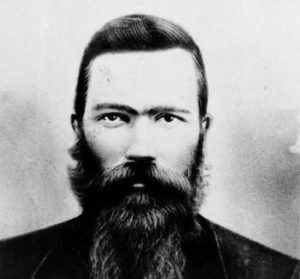
Henry Lowry
*The birth of Henry Lowry is celebrated on this date, c. 1845. He was a Lumbee Native American outlaw.
Henry Berry Lowry was born to Allen and Mary (Cumbo) Lowry in the Hopewell Community in Robeson County, North Carolina. His father owned a successful 350-acre mixed-use farm in the county. Henry Lowry was one of 12 multi-racial or freedmen children.
During the American Civil War, the Confederate government used recruitment to force many locals to work on the construction of various forts around the Cape Fear River area for very little pay. Several Lowry cousins, excluded from military service because they were freedmen, had been conscripted to help build Fort Fisher. The Lowry Gang initially started to aid those hiding from service. As the Civil War approached its end, the Lowry Gang aligned themselves with Union soldiers who had escaped from Confederate prison camps and conducted guerrilla warfare against the Confederacy.
On December 21, 1864, James P. Barnes, a neighbor of Allen Lowry, accused him of stealing hogs. Lowry's son, Henry, killed Barnes. In January 1865, Henry Lowry also killed James Brantley Harris, a conscription officer, for allegedly mistreating the women of the Lowry family. In March 1865, the Home Guard searched his father, Allen Lowry's, home and found firearms, which free people of color could not own. The Home Guard kangaroo court convicted Allen Lowry and his son William and executed them in March 1865. Henry reportedly watched from the bushes.
After that, young Henry was the new leader of the Lowry band. Lowry's band was composed mainly of Black Native Americans. His chief lieutenants were a black man, George Applewhite, and a white youth, Zachariah McLaughlin. The Lowry gang committed many robberies under unusual conditions. Victims of the thefts were treated respectfully, considering the circumstances, and the victims could potentially avoid being robbed if they could show that they could not afford it. The Lowry gang often returned certain stolen items, such as horses and wagons, when they no longer needed them. The gang, at times, was known for sharing their profits with the poor, such as distributing corn to the hungry. The attempts to capture the gang members became known as the Lowry War.
The Lowry gang consisted of Henry Lowry, his brothers Stephen and Thomas, two cousins (Calvin and Henderson Oxendine), two of his brothers-in-law, two escaped slaves, a white man, and two other men of unknown relation. In December 1865, he married Rhoda Strong; they had three children: Sally Ann, Henry Delany, and Nealy-ann. Immediately after the wedding, Lowry was arrested by former members of the Confederate Home Guard for murder. He was able to escape, and the gang would go on to evade captivity for another three years despite many efforts made by the militia to apprehend him. A few notable events include fending off a search posse while using a boat for cover and eluding troops from the United States military sent down to North Carolina specifically to capture him.
In 1871, Francis Marion Wishart of the Police Guard had the wives of the Lowry band held hostage in prison. Henry Berry Lowry and other band members sent the colonel a letter with an ultimatum: either the release of their wives of the Lowry Gang or "the bloodiest times will be here than ever was before—the life of every man will be in jeopardy." Their wives were abruptly released. Lowry's band opposed the postwar conservative Democratic power structure, which worked to reassert its political dominance and white supremacy.
The Lowry gang robbed and killed numerous people at the establishment. Because of this, they gained the sympathy of the non-white population of Robeson County. The authorities could not stop the Lowry gang because of this support. A more moderate Republican party replaced the conservative Democratic party with ideological similarities to many Lowry supporters. Lowry's gang continued its actions into Reconstruction. Republican governor William Woods offered a $12,000 reward for their capture, dead or alive. Lowry responded with more revenge killings. In February 1872, Henry Berry Lowry disappeared shortly after a robbery of over $28,000. It is claimed he accidentally shot himself while cleaning his shotgun.
As with many folk heroes, the death of Lowry was disputed. He was reportedly seen at a funeral several years later, and every gang member except two was subsequently captured or killed. Reverend Patrick Lowry, as a delegate to the Republican state convention in 1872, announced that his brother (Henry Berry) was dead. However, Henry Berry's wife, Rhoda, insisted until she died in 1909 that he had escaped, even though she remarried a few years after his disappearance.